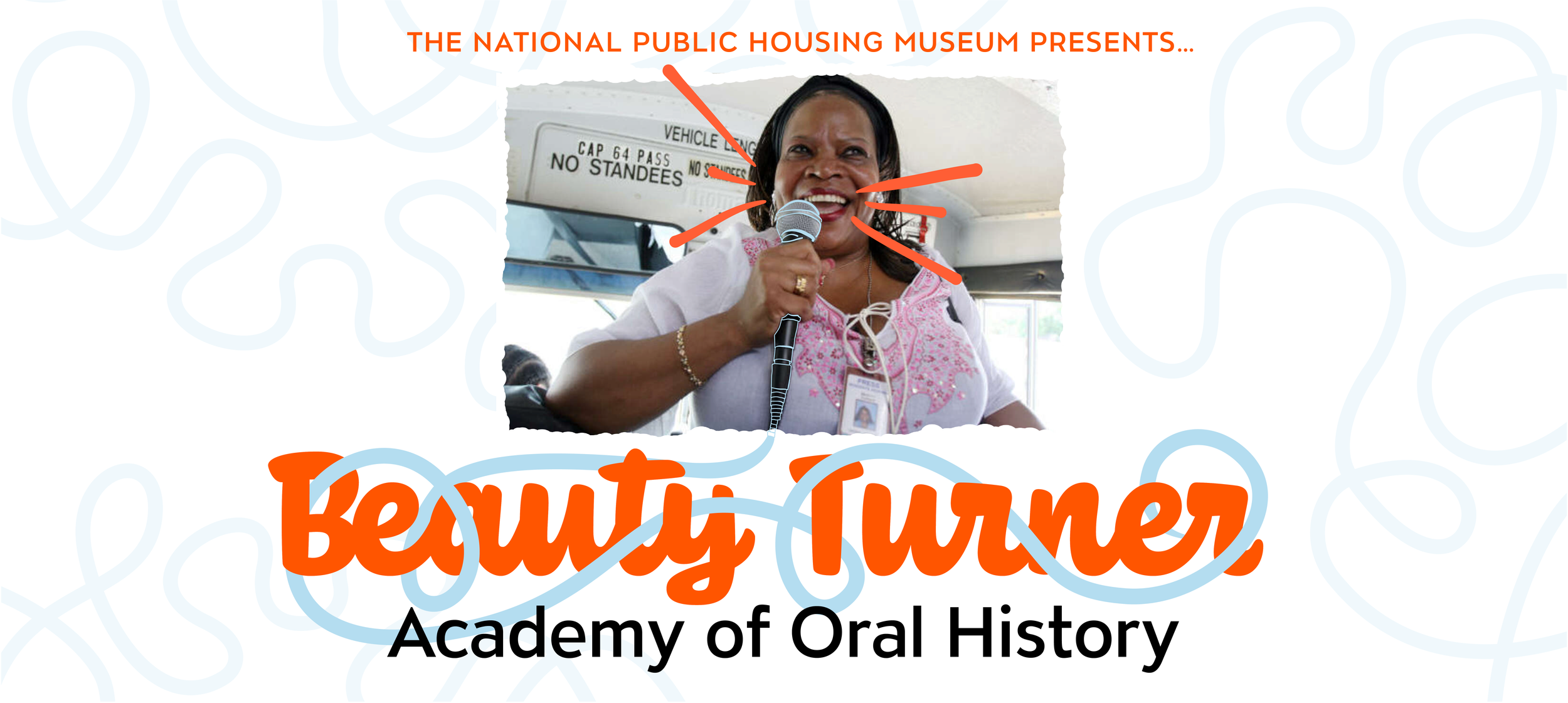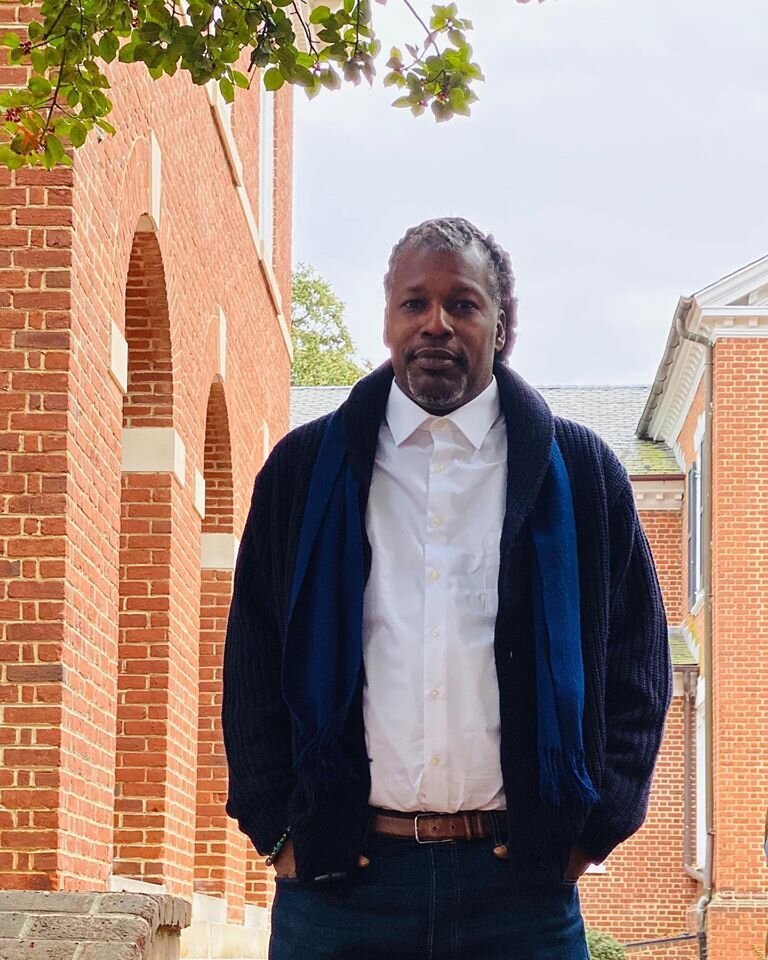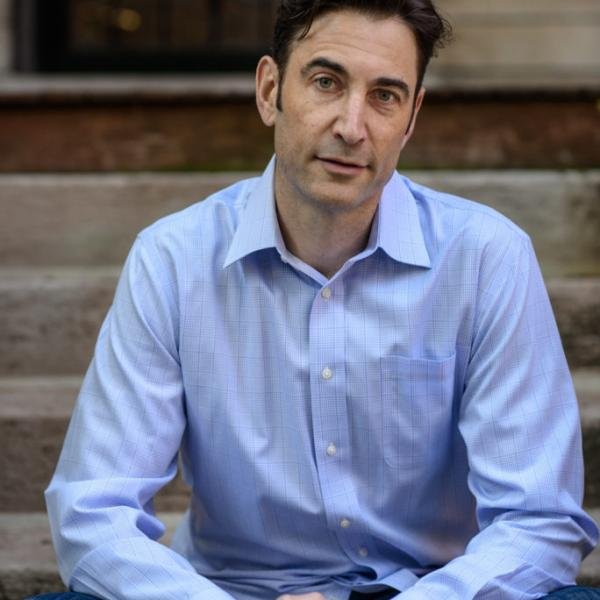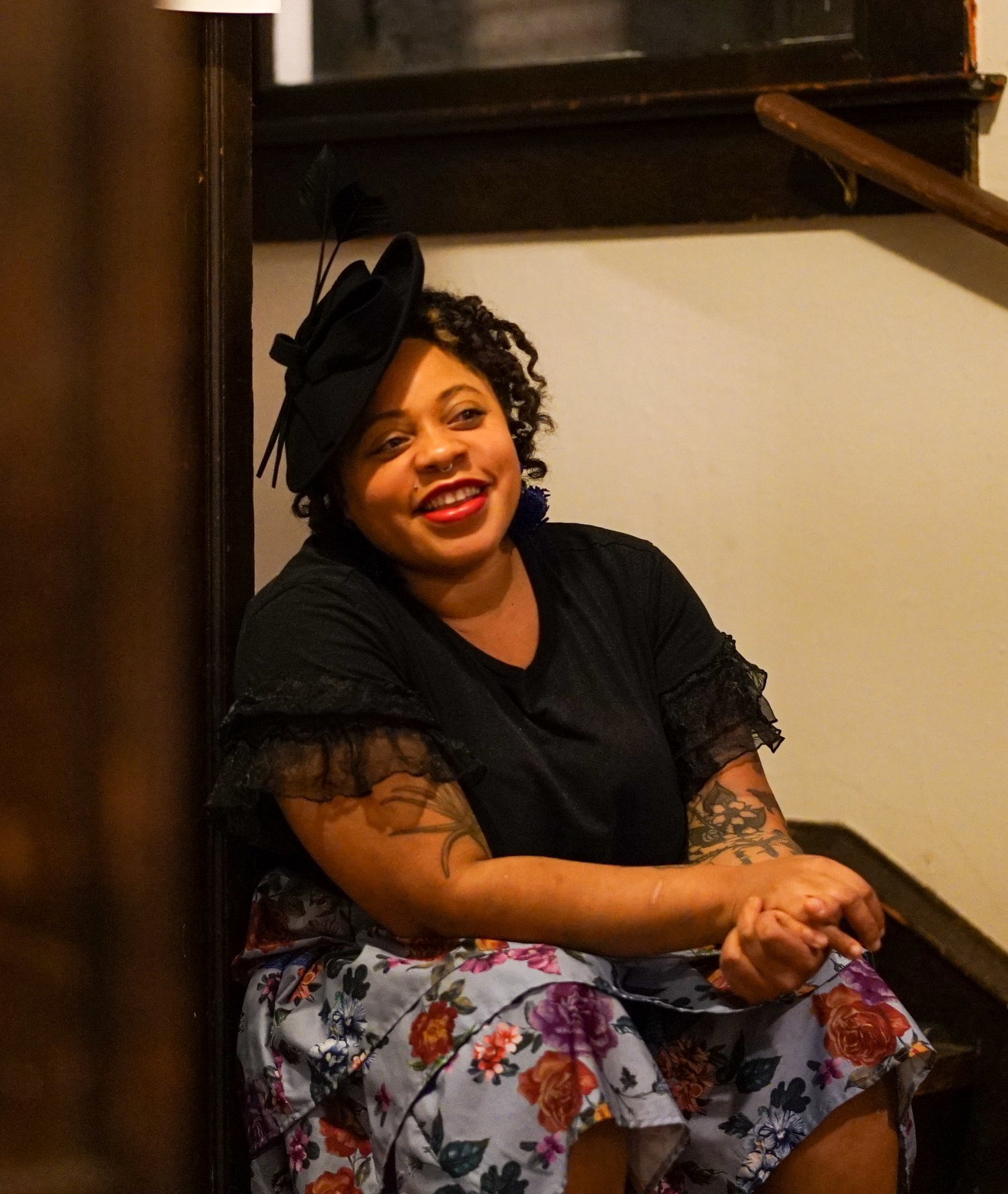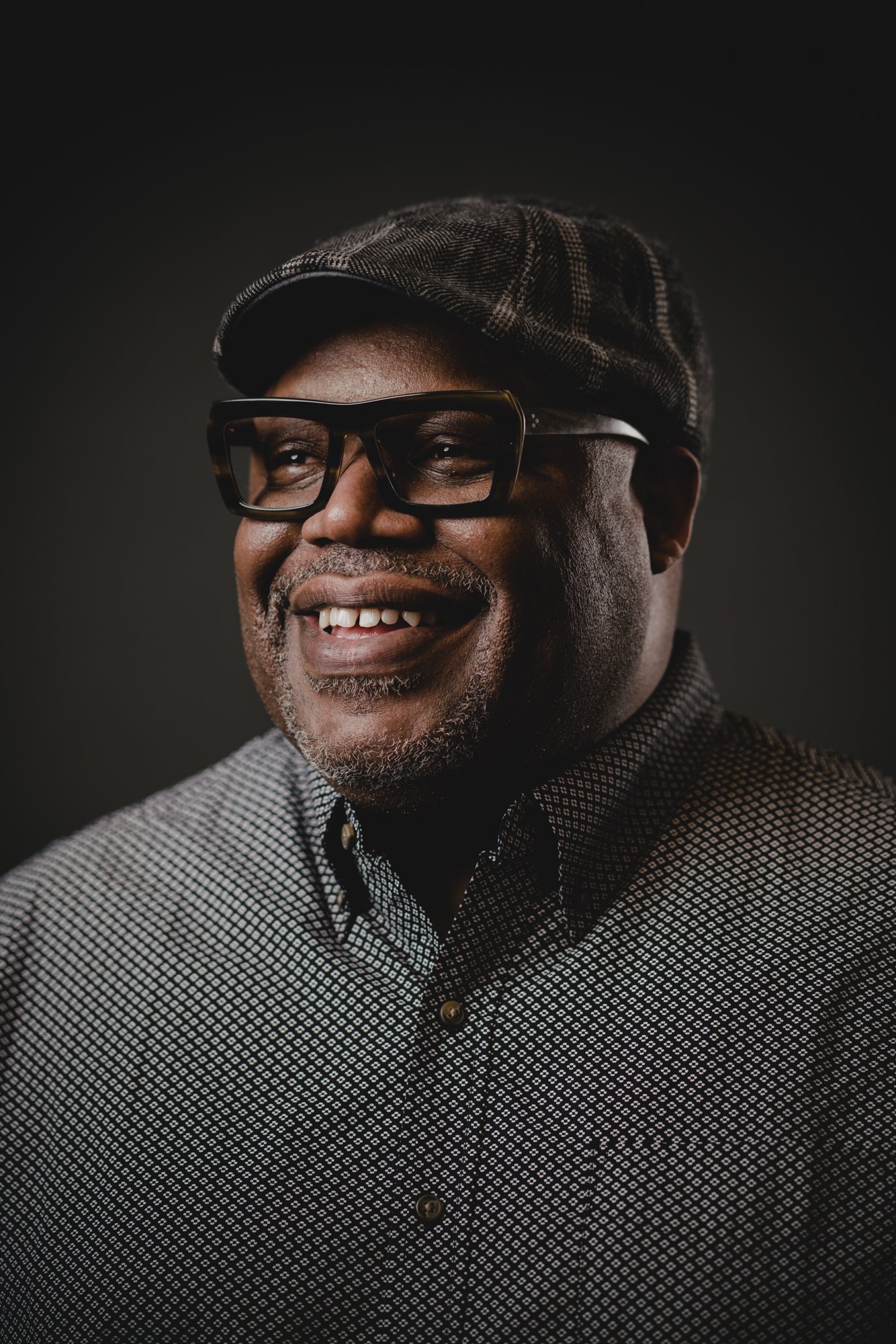The Beauty Turner Academy of Oral History
Beauty Turner, a Black woman, smiles widely in a pink shirt as she speaks into a microphone at the start of one of her “Ghetto Bus Tours,” 2007. Photo courtesy of Stacie Freudenberg, AP.
Applications for the 2023 cohort are now closed. Applicants will be notified of selection by May 31.
Interested in learning more? Check out the mixtape curated from and by the 2022 cohort!
2023 Training Details
10 weeks, with 2 hour Zoom sessions once a week
Limited required and optional “homework” between sessions
Program will run between the weeks of June 12 through August 21
Exact day and time to be determined with the final cohort
Stipend and professional audio kit, totaling approx. $1500!
Participants must attend at least 6 weeks to receive stipend
National cohort of people who call public housing home
Oral history, storytelling, archiving, and organizing experts from across the country will teach each week
The application deadline is extended to May 12!
The main application above is ONLY for new applicants; if you applied in 2022, you will receive directions for an abbreviated application by April 28th.
We will notify participants of their admittance to the Beauty Turner Academy by the end of May.
Sign up for our emails to get regular updates about application deadlines, info sessions, and more.
A screenshot of the 2022 Beauty Turner Academy cohort in “gallery view.”
What is it?
The Beauty Turner Academy of Oral History is our 10-week, intergenerational, PAID training program for current and former public housing residents, as well as those in close community with public housing residents. It is Zoom-based with a national cohort, and is the entry point for becoming a member of the Oral History Corps. Graduates of the training can refine their skills and add to the Oral History Archive through the Beauty Turner Academy Apprenticeships (Fall-Spring).
Named in honor of Robert Taylor Homes’ Ms. Beauty Turner, award-winning journalist and beloved public housing activist, The Beauty Turner Academy teaches a values-based approach to narrative history designed for people from all interests and backgrounds—not just those who see themselves as historians.
Who should apply?
To help you understand what we are looking for, here is a list of qualities we think make an ideal candidate for Beauty Turner Academy Training.
Interested in public history and the power of narrative and storytelling as methods of resistance.
Active in their own neighborhoods and communities, and/or invested in current events on a local scale.
Willing and able to work collaboratively and build generative relationships with people different from them.
Committed to long-term engagement with oral history.
Believes that housing is a human right.
16 years of age and older. Younger people with a strong interest may also reach out to discuss their eligibility.
Has a meaningful connection to public housing. We prioritize on folks with lived experience in traditional public housing, Section 8 housing, or residents of a mixed-income housing site; those with family or community ties to public housing will also be considered.
A graphic summary of what participants learned in the 2022 inaugural year of the Beauty Turner Academy, drawn by Brandon Black, aka Drawnversation. Photo courtesy of NPHM and Brandon Black.
PROGRAM Learning Goals
Training Graduates will be able to:
Connect their lived experiences and collective geniuses to the practices and ethics of oral history.
Situate oral history practice within the legacy of public housing in Chicago.
Understand the role of relationships, identities, and power in oral/narrative history.
Consider who they are as oral historians, given their identities, lived experiences, and values.
Conduct their first oral history interview.
Demonstrate key oral history skills such as deep listening, follow-up questions, checking for continuous consent, and sharing authority with the narrator.
Comfortably and confidently use a Zoom H5 Audio Recorder.
Care for, preserve, and envision creative usage of oral history interviews.
Transfer, back up, and manage digital files.
Make basic audio edits and transcripts using Audacity and Otter software systems, respectively.
Understand the versatility of oral history methods, ethics, and values for historical, creative, and organizing projects.
Apprentices will be able to:
Conduct outreach with potential narrators to secure [and follow up regarding] an oral history interview.
Confidently conduct an oral history interview to include in the NPHM Archive. [unless extenuating circumstances]
Conduct oral history post-production tasks, such as transcribing the interview and writing a finding aid entry.
Develop their understanding of who they are as an oral historian.
Senior apprentices will be able to:
Confidently and consistently conduct oral history outreach, interviews, and post-production.
Design and begin executing an oral history project.
Utilize their oral history training to create a podcast, creative writing project, visual arts project, action research plan, or other creative output.
Understand the technical, ethical, and creative considerations that go into creating a community-based archive.
Understand and practice the technical, ethical, and creative aspects of curating full-length oral history interviews into clips for programming and exhibitions.
Deepen and further develop their understanding of who they are as an oral historian and memory worker.
Beauty Turner Principles:
The values that Ms. Beauty embodied, and that guide our curriculum design and teaching.
Actively inclusive, accessible, equitable, and anti-elitist.
Imbued with radical care and responsive to the needs and well-being of those involved.
Elevates projects and practitioners who center justice, liberation, BIPOC lived experience, and community autonomy in their approaches.
Applicable to everyday lives and for a wide variety of interests (ex., organizing work, art, culture)
Interested in seeing a weekly breakdown?
Check out our full 2022 syllabus here—please use and share with care! The 2023 program will have a revised curriculum, but will address similar learning goals.

This work is licensed under a Creative Commons Attribution-NonCommercial-ShareAlike 4.0 International License.
2022 Beauty Turner Academy Mentors
The four Beauty Turner Academy mentors provide ongoing support and continuity during the 8 week training period, as well as continuing support during the apprenticeships. The mentors also facilitate the Beauty Turner Academy weekly sessions that were not hosted by a guest educator.
Noor (they/them)
Noor Alzamami (they/them) is an oral historian and storyteller based out of Seattle, WA. Since receiving their M.A. in Oral History from Columbia University in 2020, Noor has focused on community-based story telling projects with an emphasis on queer and/or trans people of color.
Previously Noor worked as a passionate sex educator and facilitator that has done everything from creating youth centered and trauma-informed curriculum to virtual anti-oppression workshops with over 100 international oral historians.
Noor approaches oral history as conversational. The narrator is always in control; Noor works as a non-judgemental witness. Consent is always at the forefront.
Tamara (they/them)
Tamara Santibañez (they/them) is an interdisciplinary artist and oral historian living and working in Brooklyn. Their work is rooted in storytelling and the visual language of identity construction, exploring subcultural semiotics and the meanings we make from bodily adornment. They approach the the body as a site for archiving and accessing personal and collective narratives and view tattooing as a political intervention. As a queer and trans artist, their practice memorializes the language and resistance strategies used by “othered” populations to build alternative worlds.
Troy Gaston (he/him)
Troy (he/him) is a former Robert Taylor Homes resident, and is currently an organizer with Black Lives Matter, a McNair Graduate from Roosevelt University (Political Science and Legal Studies), and was a 2022 Chicago United for Equity (CUE) Community Building Fellow. Troy is pursuing his Ph.D. in Political Science at the University of Illinois Chicago (UIC), continuing his research centered on Black women impacted by the carceral system (with particular emphasis on community within the Robert Taylor Homes). Troy is a regular interviewer for the NPHM Oral History Corps, and is also one of three members of the NPHM Research Oral History Corps, who are collaborating on a NEH- & OHA-funded project about ethical audio-based research with incarcerated communities.
Liú (they/them)
Liú (they/them) is a queer, trans non-binary, disabled, Abolitionist nerd and cultural organizer, descended from the islands of Taiwan and Ireland. They are currently the Oral History Program Manager at NPHM. Liú views storytelling and narrative history as key strategies for cultivating more holistic understandings of our pasts, presents, and futures; thawing trauma, and nurturing authentic connection. At NPHM, they focus on building capacity among misrepresented communities and empowering them with the agency and skills to document, preserve, and share histories from their perspectives. Liú’s personal work also centers community self-determination and anti-imperialism, as well as chosen family, Blasian coalition movements, and the textures of silence. Their Master’s thesis about asian queer-trans kinship was the runner-up for the Jeffrey H. Brodsky Oral History Award, and can be heard at www.tidalflats.xyz.
2022 Beauty Turner Academy Educators
Guest educators from the history, memory work, and housing justice fields were invited to teach the key, curriculum-heavy weeks of the Beauty Turner Academy, allowing participants to learn from and connect with a wide range of practitioners.
Week 1: Laying the Foundations: Chicago, Public Housing, and Ms. Beauty Turner
Left: Willie "J.R." Fleming (he/him) has over 20 years of experience as a community organizer and human rights defender. He is currently the Executive Director of the Chicago Anti-Eviction Campaign (CAEC), Board President of the Chicago Owner’s Land Trust (COLT), and is the President of a Section 3 Minority Owned Company. His activism and organizing grew out of the demolition of public housing and the devastating impacts felt by his community from displacement. Dedicated to enforcing human rights, J.R. has organized with groups such as the Chicago Coalition to Protect Public Housing, U.S. Human Rights Network and the Hip Hop Congress. He previously served as the Chicago City Chair and lead coordinator for the United Nations International Covenant on the Elimination of Racial Discrimination (ICERD), UN Human Right to Adequate Housing's official missions to the U.S.
J.R.’s work has earned him recognition in books, short films, local-international documentaries, television shows, news broadcasts, and magazines including a nine-page cover story in the NY Times Magazine titled "The Death and Life of Chicago." In 2013 he was given the Human Rights Movement Builder Award along with seven other notable human rights leaders nationally by the US Human Rights Network.
Right: Ben Austen (he/him) is a writer, lecturer, and podcaster from Chicago. He is the co-host of the podcast Some of My Best Friends Are and the author of High-Risers: Cabrini-Green and the Fate of American Public Housing. High-Risers was long-listed for the Andrew Carnegie Medal of Excellence in Nonfiction, shortlisted for the Goddard Riverside Stephan Russo Book Prize for Social Justice, and named one of the best books of 2018 by Booklist, Mother Jones and the public libraries of Chicago and St. Louis. A former editor at Harper’s Magazine, he is a story consultant on the podcast The City and a senior fellow at the Invisible Institute. His feature writing has appeared in the New York Times Magazine, Wired, GQ, The Best American Travel Writing, and many other publications. He is currently at work on a narrative nonfiction book about the parole system and the county’s practices around crime and punishment.
Week 2: Intro to Oral History from a Justice-Centered Approach
Dr. Nikki Yeboah (she/her) is an Assistant Professor of Playwriting in the School of Drama at the University of Washington. As an artist-scholar, her research brings together oral history methods and performance to create alternative records of Black life. Her research interests include oral history performance, black feminism, and the ethics and politics of conducting qualitative research in marginalized communities. She has been published in; Theatre Journal, Text and Performance Quarterly, Frontiers: A Journal of Women Studies, and the Western Journal of Communication. Her creative work explores black feminist performance aesthetics, and her workshops mobilize storytelling to inspire community building. Her most recent performances have been staged at the Soraya (Los Angeles), New College of Florida (Sarasota) the Hammer Theatre (San José), the Marsh (San Francisco), Links Hall (Chicago), and the Chicago Cultural Center. Nikki is currently a board member of Storycenter, a nonprofit organization that uses storytelling for social justice.
Week 4: Conducting the Oral History Interview
Alissa Rae Funderburk (she/her) is the Andrew W. Mellon Foundation funded Oral Historian for the Margaret Walker Center at the HBCU Jackson State University in Jackson, Mississippi. She maintains an oral history archive that, like the Center, is dedicated to the preservation, interpretation, and dissemination of African American history and culture. Previously, she created an oral history course for high school students at the Roger Lehecka Double Discovery Center and conducted freelance oral history interviews for the city of Jersey City.
While completing coursework in the Oral History Masters Program at Columbia, Alissa Rae served as the Deputy Director of the Columbia Life Histories Project alongside its co-founder Benji de la Piedra. Her OHMA thesis on the religious and spiritual experiences of Black men in New York City was based on her studies of race, culture, religion, and the African diaspora, when graduating from Columbia College in 2012 with a bachelor’s degree in anthropology as a John W. Kluge Scholar. Alissa Rae is a native New Yorker, newly elected OHA council member, avid reader, and yoga enthusiast with a passion for travel.
Website: https://www.alissaraefunderburk.com/
Week 5: Tech Week
Photo by: Jennifer Buhl. Courtesy of Lex Brown.
Lex Brown (she/her) is an artist who uses poetry and science-fiction to create an index for our psychological and emotional experiences as organic beings in a rapidly technologized world.
She has performed and exhibited work at the New Museum, the High Line, the International Center of Photography, Recess, and The Kitchen in New York; REDCAT Theater and The Hammer Museum in Los Angeles; The Baltimore Museum of Art in Baltimore; and at the Munch Museum in Oslo, Norway. She is a 2021 recipient of the USA Fellowship. Brown holds degrees from Yale University (MFA) and Princeton University (BA). She is the author of My Wet Hot Drone Summer, a sci-fi erotic novella that takes on surveillance and social justice, first edition published by Badlands Unlimited. Consciousness, a survey of Brown's work spanning the past 8 years, is available from GenderFail. Brown is the host of the podcast 1-800-POWERS available on Spotify and Apple Podcasts.
Website: https://lexbrown.com/
Week 7: Action Modules
Various types of community, justice, and artistic practitioners share how they use elements of oral history in their work.
Left: Elisheba Johnson's (she/they) vision for cultural placemaking drives our growth as a cultural institution. She served as public art manager for the city’s Office of Arts and Culture and founded and operated Faire Gallery and Café before becoming Wa Na Wari’s curator. Elisheba is a conceptual artist heavily influenced by the Fluxus movement and the accessibility of art experiences and objects. She sees art “taking the role of philosophy in the 21st century” and providing “the frame for discussing and solving our complex and important civic problems.
Johnson, who has a BFA from Cornish College of the Arts, was the owner of Faire Gallery Café, a multi-use art space that held art exhibitions, music shows, poetry readings and creative gatherings. In 2018, Johnson started a public art practice with her collaborator Kristen Ramirez. They believe in creating opportunities that bring equity, accessibility, relevance, and engagement to a community, and they believe that every project ought to begin with meaningful engagement with the people who occupy the place, whether through questionnaires, story-telling, historical research, or celebration. Elisheba is currently a member of the Americans for the Arts Emerging Leaders Network advisory council and has won four Americans for the Arts Public Art Year in Review Awards for her work.
Right: Inye Wokoma (he/him) has been the Guardian of Estate for his grandmother, Goldyne Green, since 2016. He is instrumental in coordinating a site control vision between Wa Na Wari and the Green family. He is also the co-lead organizer in our work with Black homeowners. Inye's family has lived in the Central District since the 1940s. As a journalist, filmmaker and visual artist, he explores themes of identity, community, history, land, politics and power through the lens of personal and visual narratives. His work is informed by a deep social practice that prioritizes the utility of his art to the collective welfare of his community. Three of his most recent projects, A Central Vision, An Elegant Utility, and This Is Who We Are, represent prismatic explorations of the history, current experience, and future of Seattle’s African American Community. In addition to these projects, Inye has been working in collaboration with Seattle Public Library and colleague Jill Freidberg to create a catalog of oral histories of Seattleites reflecting on community history and current changes.
Inye completed a degree in journalism and filmmaking from Clark Atlanta University before establishing Ijo Arts Media Group in Seattle. He has won numerous awards between 2004–present, including coverage of the communities of color in the wake of 9/11 and Hurricane Katrina.
Walis Johnson (she/her) is a Brooklyn-based multidisciplinary artist/researcher whose work documents the experience and poetics of the urban landscape through oral history, artist walking practices, film, and installation. Her Red Line Archive Project has been presented locally in New York and internationally. She holds an MFA from Hunter College in Integrative Media and Documentary Film and has taught at Parsons School of Design and a graduate course in oral history at Hunter College.
Cherish Chang (they/them) is a nonbinary QPOC and designer. They hold a BFA in Graphic Design from the Academy of Art University and currently own a small studio based in Oakland. Their studio is focused on cultural storytelling through print design, packaging and branding. They are also presently a Creative Director at Afterlife Press, designing publications on contemporary tattooing.
They have worked as a Senior Designer at Mucho San Francisco, and at Imprint Projects with some of the world's leading brands such as Levi’s, Google, PayPal and Apple. They regularly donate time to SOMArts cultural center, serve as a mentor at Project Mentor working to uplift women in the design industry, and as a portfolio reviewer at AIGA. In their spare time, they can be found at the beach with their dog, Dude.
socials: @cherish.jpg
about Beauty Turner:
Turner lived in the well-known Robert Taylor Homes for 16 years, inspiring her to found the “GHETTO [Greatest History Ever, Told To Our People] Bus Tours.” Turner’s tours took visitors through various Chicago Housing Authority complexes and featured residents reflecting on their experiences and views of public housing.
The NPHM is honored to be working with her eldest son, Larry Turner, to preserve, honor, and uplift her legacy.
To learn more about Ms. Beauty Turner, go to our Legacy & Lineage page, coming soon!

